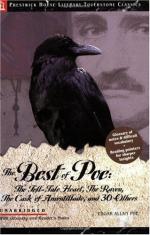Poe created the fifth line of his stanza for the magic of the repetend. He relied upon it to the uttermost in a few later poems,—“Lenore,” “Annabel Lee,” “Ulalume,” and “For Annie.” It gained a wild and melancholy music, I have thought, from the “sweet influences,” of the Afric burdens and repetends that were sung to him in childhood, attuning with their native melody the voice of our Southern poet.
“The Philosophy of Composition,” his analysis of The Raven, is a technical dissection of its method and structure. Neither his avowal of cold-blooded artifice, nor his subsequent avowal to friends that an exposure of this artifice was only another of his intellectual hoaxes, need be wholly credited. If he had designed the complete work in advance, he scarcely would have made so harsh a prelude of rattle-pan rhymes to the delicious melody of the second stanza,—not even upon his theory of the fantastic. Of course an artist, having perfected a work, sees, like the first Artist, that it is good, and sees why it is good. A subsequent analysis, coupled with a disavowal of any sacred fire, readily enough may be made. My belief is that the first conception and rough draft of this poem came as inspiration always comes; that its author then saw how it might be perfected, giving it the final touches described in his chapter on Composition, and that the latter, therefore, is neither wholly false nor wholly true. The harm of such analysis is that it tempts a novice to fancy that artificial processes can supersede imagination. The impulse of genius is to guard the secrets of its creative hour. Glimpses obtained of the toil, the baffled experiments, which precede a triumph, as in the sketch-work of Hawthorne recently brought to light, afford priceless instruction and encouragement to the sincere artist. But one who voluntarily exposes his Muse to the gaze of all comers should recall the fate of King Candaules.
The world still thinks of Poe as a “luckless man of genius.” I recently heard him mentioned as “one whom everybody seems chartered to misrepresent, decry or slander.” But it seems to me that his ill-luck ended with his pitiable death, and that since then his defence has been persistent, and his fame of as steadfast growth as a suffering and gifted author could pray for in his hopeful hour. Griswold’s decrial and slander turned the current in his favor. Critics and biographers have come forward with successive refutations, with tributes to his character, with new editions of his works. His own letters and the minute incidents of his career are before us; the record, good and bad, is widely known. No appellor has received more tender and forgiving judgement. His mishaps in life belonged to his region and period, perchance still more to his own infirmity of will. Doubtless his environment was not one to guard a fine-grained, ill-balanced nature from perils without and within. His strongest will, to be lord of himself, gained




